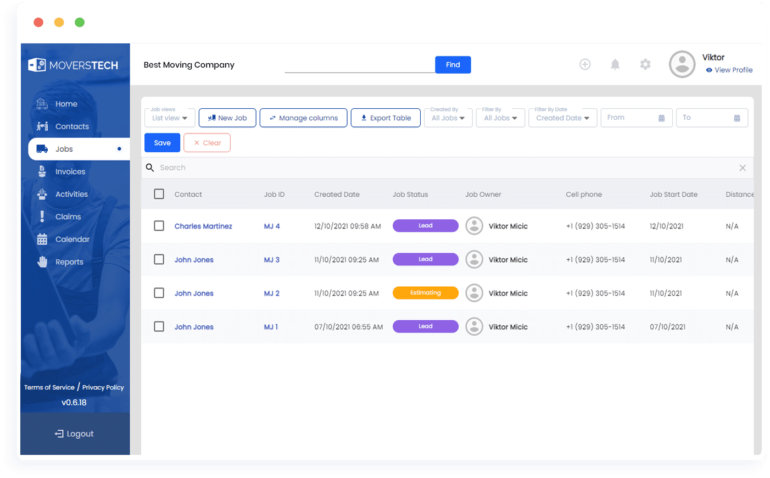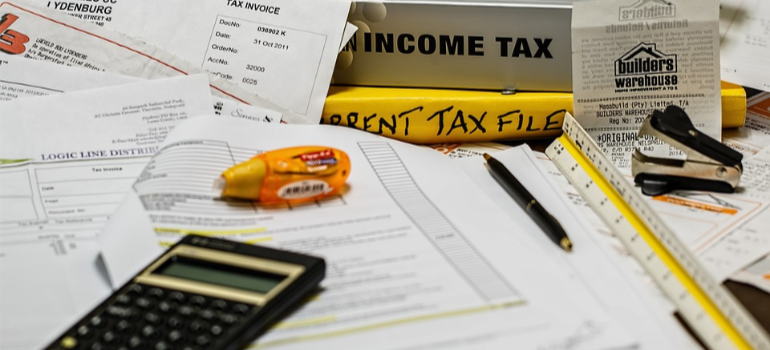If you’re in any way involved in the relocation industry, you likely know just how complicated it can be. There’s much paperwork to manage, from the first quote to the final receipts and throughout any moving job. Needless to say, that complexity is one of the prime reasons for moving companies to go paperless.
It’s not the only reason, however. The digital age presents many compelling reasons, from customer expectations to team management. In this article, we’ll explore the main ones among them, consolidated into categories for your convenience. And once we do, we’ll outline how CRM software can help you see such a change through.
The 5 main reasons for moving companies to go paperless
As highlighted above, there are many reasons to consider such a change. If you’re reading this article, chances are you already have a few of your own in mind.
We respect your time, however, so we’d instead not list every peripheral reason individually. Instead, we’ll group them up into 5 main reasons – without missing the value of each. These same reasons might also be signs your moving company needs a CRM, as we’ll discuss next.
#1 Document organization
One of the most pressing needs across all industries, regardless of business size, is that for proper document organization. Consider how much paperwork typically goes into one moving job – and multiply that by a weekly number of moves you make. Preserving such massive troves of papers, organizing them for each client, and retrieving them as needed is simply unsustainable.

In addition, such non-digital information is almost entirely isolated from your digital efforts. Whether you’re delving into digital marketing or are simply trying to keep track of individual clients or jobs, documents in paper form do you a few favors.
#2 Time efficiency
Tied to the above, there’s the ever-present issue of time efficiency. No matter your moving business size, you’d always want to ensure all time spent is time spent well. Any time waste directly impacts your final revenue, adding unnecessary costs and lost productivity.
In this regard, too, working with papers can be highly detrimental. Forbes identifies it as one of the worst business time wasters, and rightly so; consider how much time is wasted on manual data input or even simply locating a missing document. Time efficiency is one of the best reasons for moving companies to go paperless.
#3 Cost savings
Alongside time waste, which itself can cost severely, come general costs. Working with paper is not cheap, as stats show:
- The average employee’s printing habits cost businesses $725 per year. That’s only the average, too, and it increases with business size.
- Paper shredding can cost about $1 per pound of paper. This may not seem like much, but it can stack up very quickly.
- According to Record Nations studies, miscellaneous costs, such as paper rims, storage, filing, and in-house file manager labor, can stack up to ~$46,000 annually.
While each cost may seem negligible, their sum can strain your budget. Going digital eliminates such needless costs, a big part of its appeal.

#4 Security
Adjacent to potential costs comes security – or, more specifically, data preservation.
For one, working with paper leaves documents vulnerable to being misplaced and lost. You may have experienced this; one employee’s slip-up gets a crucial copy lost, and disarray ensues. In addition, paper can be damaged or stolen. And while break-ins may be rare, a simple coffee spill isn’t. Why risk it when you could go digital and enjoy peace of mind?
#5 Access to information
Finally, having touched on data accessibility already, we can highlight access to information here. In this regard, there are two final reasons for moving companies to go paperless.
One lies in document organization, which we’ve outlined above. Digital documentation makes data access more accessible, as the correct document is only a few clicks away. The other, closely tied to it, is access authorization. From your employees to external actors, how secure is your data? Human error and malice are out there, and a digital cloud-based solution could help alleviate both.
How CRM can help you go paperless
With the above in mind, we can conclude with how solutions like MoversTech CRM for moving companies can help you transition from paper-based to digital and paperless. In order, consider the five following points.
#1 Keeping all your documents in one place
First, a CRM’s inherent function is to improve document organization. Just how each solution does so will slightly differ, but typical assets include:
- A centralized database accessible from a single dashboard
- Organizational tools such as customizable client tags
- Detailed records of past interactions with clients and completed jobs
Instead of tracking down multiple paper documents on an individual client, a CRM’s digital approach can bring all relevant information to your fingertips.

#2 Tracking and ensuring time efficiency
Second, addressing one of the key reasons for moving companies to go paperless, CRM solutions help ensure time efficiency. They do so in 3 main ways:
- Reducing time waste; with swift access to valuable data, less time is wasted locating information and sharing it among involved employees
- Tracking time spent; with a firm grasp on time expenditures, from executing a move to breaks taken, managers can stay on target
- Monitoring employee performance; knowing exactly how efficient each employee and crew member is, managers can intervene or reward excellence as needed
With a centralized database and a clear overview of each moving job, customer, and employee, day to day operations can be streamlined to minimize time waste. In turn, the less time your teams waste, the more time they’ll have for meaningful customer interactions.
#3 Reducing costs and streamlining expenditures
Third, regarding costs, CRM solutions can offer distinct peace of mind. They can both cut down on operational costs and ease financial interactions in such ways as:
- Saving on paper-related costs; a digital dashboard does away with printing, shredding, managing, and other paper-related costs
- Enhancing order processing and payments; a centralized database removes the hassle of manually processing orders and payments and tracking them down by hand
- Accurately calculating costs and estimates; with a comprehensive overview of operations and costs, a good moving CRMs minimize the risk of miscalculations.
Of course, each CRM’s exact features will differ – but their inherent cost-related benefits largely remain. Most reputable CRM solutions address cost-related reasons for moving companies to go paperless by their very design.

#4 Minimizing human error
Fourth, on the subject of human error, we all know how costly it can be. NASA identifies tens of billions in damages caused by human error – and while this may not be the case for you or any one business, it’s not a cost for anyone to gladly take up.
On this front, consider such CRM perks as:
- Swift data updates – with your CRM in hand, employees can swiftly and efficiently update any job’s or customer’s records on the spot, without delays which can cause errors or forgetfulness
- Automatic report generation – your CRM can also automatically generate reports for you, minimizing the risk of human error on this crucial front
- Data backups – if a human error does slip through, your CRM can also allow for swift access to backups and prevent the mistake from escalating
That CRM can be such thorough, extensive tools also reduces the possibility of human error by simply decreasing complexity. Where you’d likely use different tools for such functions as reports, CRMs consolidate them all under one roof, offering simplicity and a safer management ecosystem.
#5 Breaking down data for your teams
Finally, speaking of complexity, one of the most pressing reasons for moving companies to go paperless are your employees. Getting your teams on the same page might be a hassle, especially if internal collaboration tools are lacking.
In this regard, too, you can use CRM to improve internal communication and break down data with such features as:
- A centralized database and task delegation tools
- Clear records of marketing, sales, and post-sale interactions
Once your teams work under the same dashboard and on the same data, their collaboration can only improve. This invaluable benefit will allow them to approach operations and best cater to your customers.

Going paperless with CRM is easier than ever before
In closing, there are many reasons why leaving paper behind is in your moving business’s best interests. From document organization to costs and information access, the digital age calls for nothing short of seamlessness.
Fortunately, CRM solutions for movers have evolved in strides and are now more accessible than ever before. They present a tailor-made solution for going paperless, and they offer ample benefits to boot. Over 90% of all businesses with more than 11 workers use CRM – and if you’re to go digital, so should you.
Stay Informed
Subscribe for industry
news & updates
"*" indicates required fields

